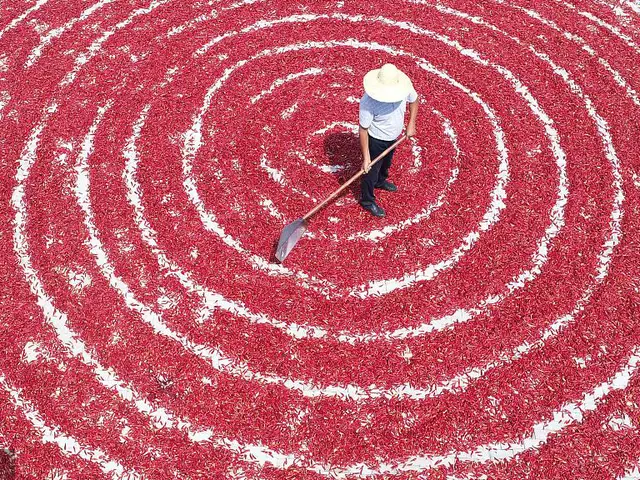Gao Xiangqiu is locally known as the "chili queen." Her Haixing Village-based cooperative has planted over 666 hectares of chilies in the city of Hailun in northeast China's Heilongjiang Province and has helped many local residents get rid of the poor old days of relying on a meager income from growing corn.
"We could only make several thousand yuan a year by growing maize but now I can earn over 20,000 yuan (about 2,800 U.S. dollars) working at the cooperative," said Wang Zhizhong, a local resident.
Wang has entered his fifth year at the cooperative. His family was once trapped in poverty as his wife lost her eyesight, making him unable to work outside the home.
Now, encouraged by Gao, a total of 270 households have engaged in chili growing in the village and the spicy business brings each an additional annual income of at least 12,000 yuan. The annual income of her cooperative, which was established in 2015, exceeded 3.7 million yuan in 2019.
But this year the novel coronavirus epidemic hit Gao off-guard and spoiled her plans to further expand the chilly plantation area. Even when work began to resume on March 4 as the situation eased, the number of farmers back to their posts was far from enough, and the current chili production area is more than 266 hectares less than the previous year.
This has also made Gao realize the importance of introducing high-end skills and further enlarge planting ranges and varieties. As a deputy to the National People's Congress (NPC) -- China's national legislature -- she plans to add the voices of local residents and share her ideas on agricultural production in her proposals to be submitted at the upcoming "two sessions" -- the sessions of the NPC and the National Committee of the Chinese People's Political Consultative Conference (CPPCC).
"Soils in Hailun are rich in selenium, which echoes consumers' growing need for a healthy diet. But there are no criteria to define selenium-rich food so I will suggest that relevant departments set up laboratories to promote its research and sustained development," said Gao.
To solve skills shortages in rural areas, Gao suggests further optimizing policies to attract high-end and young talents, especially in areas spanning tourism, e-commerce and green agriculture.
"Great changes have taken place in agricultural development over the years; from 'relying on the weather' to 'relying on hard work and technology,'" said Gao. "My dream is to help more people reduce their poverty rates and I will stick to that goal and continue to do my part," she said.
 简体中文
简体中文

